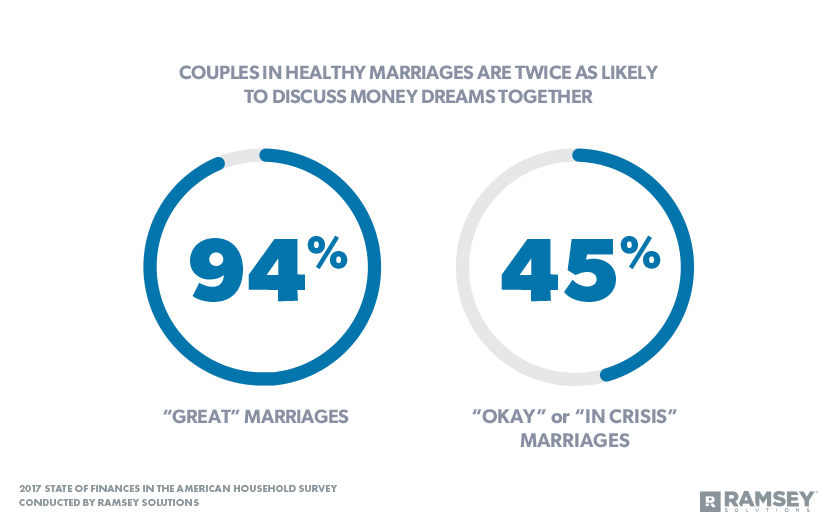Do you think combining money and marriage is a recipe for disaster? You’re not alone. Money is the number one issue married couples fight about, and it’s the second leading cause of divorce, behind infidelity.1 When we talk about money in relationships of any kind, we’re bound to find some frustration and tension.
No matter how much you love your spouse, trying to merge your lives—and “his and her money”—can be a bumpy (but still beautiful!) ride. After all, you both are coming from different life experiences, and the way you perceived and internalized those experiences was probably very different. That’s why you sometimes have two very different views on money!
So, give each other grace. And use these seven steps to build bridges, not burn them:
1. Keep a joint bank account.
Some couples think the best way to avoid money arguments is to keep separate checking accounts. His paycheck goes into one account, hers goes into another, and they each pay bills separately. No harm, no foul, right? Wrong. This lays the groundwork for major problems with your money and marriage.
But you guys, marriage is a partnership. It’s no longer “his and her money.” The officiant said, “Two become one.” Separating the money and splitting the bills is a bad idea that only leads to more money and relationship problems down the road. Don’t keep separate accounts. Put all of your money together and begin to look at it as a whole.
2. Discuss your lifestyle choices together.
Let’s say you’re perfectly content shopping at Goodwill when you need to update your wardrobe, but your spouse loves to buy name-brand items at full price. If you have an income that doesn’t support expensive taste, that’s going to be a problem.
Marriage is all about compromise. If one of you has more expensive taste, consider shopping at an outlet mall to snag those name brands at affordable prices.
Because the bottom line is: Your lifestyle needs to line up with your actual income—not what you wish it was. You might want to live like a perfectly curated Instagram post, but don’t let yourself fall down that rabbit hole. Especially when there aren’t enough zeros in your bank account.
3. Recognize your difference in personality.
Everyone’s money mindset is different, and opposites tend to attract. Chances are, one of you loves working with numbers (the nerd) and the other one would rather not be tied down by what the numbers show (the free spirit). One of you might be the saver and the other is more inclined to spend.
While personality differences cause some marital problems, it isn’t the real root of your money and marriage issues. The source of the problem is whenever one of you neglects to hear the other’s input, or when one of you bows out from handling the finances altogether.
Listen up, financial nerds. Don’t keep the money details all to yourself. And stop using your “knowledge” to boss around your free-spirit spouse.
If you’re the more carefree spouse, don’t just nod your head and say, “That looks great, babe.” You have a vote in the budget meetings! Give feedback, criticism and encouragement.
News flash: You’re both on the same team here, so work on the budget together! Use your personality differences to become a stronger, more united team.
4. Don’t let salary differences come between you.
For most couples, one of them probably makes more money than the other. Rarely will you both be making the exact same salary. But whether the amount comes to $50 or $50,000 more a year, the same problem can arise.
![]()
The Dr. John Delony Show helps people through real-life marriage challenges. Listen now!
Instead of seeing the full pot as “our money,” you might think you have leverage over your spouse—all thanks to a few extra digits on your paycheck. Sometimes the spouse bringing in the most money can feel entitled to the most say. Don’t even go there. That’s just asking for more money and relationship troubles.
It’s not yours or mine—it’s ours. There’s no reason to hold a higher income over the other’s head. You’re on the same team. Start acting like it.
On the other end of the spectrum, the one who makes less or stays at home with the kids might feel like they shouldn’t have as much say. I’ve heard many stay-at-home moms tell me they feel guilty for speaking into the budget or even spending money on anything more than the bare necessities. But remember, you’re on the same team. You have equal say in your money and marriage. And don’t even get my started on the value stay-at-home parents provide—you’re already saving your family money in so many ways!
5. Keep purchases out in the open.
Being unfaithful to your spouse doesn’t always involve an affair. Sometimes it’s when you’re unfaithful to a shared financial goal by opening a side bank account or stashing away cash. That’s deceitful. The same applies if you have a credit card your spouse knows nothing about.

It’s crucial to be open and honest about any side checking or savings accounts or secret credit cards you have. It’s time to own up to the truth and clear the air. Then, work toward establishing financial trust again. Recommit to your shared financial goals and remember why you’re doing it. You’re in this together!
6. Set expectations together.
When it comes to money and relationships, unmet expectations can cause a lot of conflict. The quickest way to feel unfulfilled and unsatisfied with your spouse is when you expect things to go a certain way, only to find out reality is a bit different.
If you’ve always thought you have to immediately buy a house after getting married, you might feel let down when you celebrate your first anniversary in the apartment you’re renting. Don’t let your unrealistic expectations pave the way for money and marriage problems!

There’s no rule stating married couples have to buy a home, start a family, or go on a trip to Paris during their first year of marriage. If those things aren’t feasible for you right now, stop worrying. Get your money in order now so that later you can make your dreams a reality.
7. Don’t let the kids run the show.
Your kids are begging you for the latest video game. You think about how well they’ve behaved lately and figure, why not? But your spouse is upset because it isn’t in the budget. Hello, Impending Money Argument! Would you like to take a seat right between Unmet Expectations and Personality Differences? We’ll be right with you.
Whether it’s buying them toys, giving them an allowance, or just paying for their sports equipment, kids have a way of bringing out the way couples view money differently.
You need to come together, talk about it, and make a plan. Decide together how to budget for the things your children need. But what about all of their pesky wants? Discuss the possibility of establishing chores and a commission (or allowance) for the work they do. This can help them establish a great work ethic, all while teaching them how important it is to wait for the things you want in life!
Money and Marriage Should Go Hand in Hand
It’s time to stop making these money mistakes and find common ground. Because, listen, cultivating a solid marriage takes time and intentionality. It can be an awkward or even frustrating process, but you can learn how to discuss your finances in a more productive way.
And remember, you married this person for a reason. Believe it or not, you need their skills, insight and perspective—especially the ones you don’t have. That free spirit or nerd can bring valuable insight and knowledge to the table. They’re your teammate, and it’s time to start treating them like one.
Read the full article here






